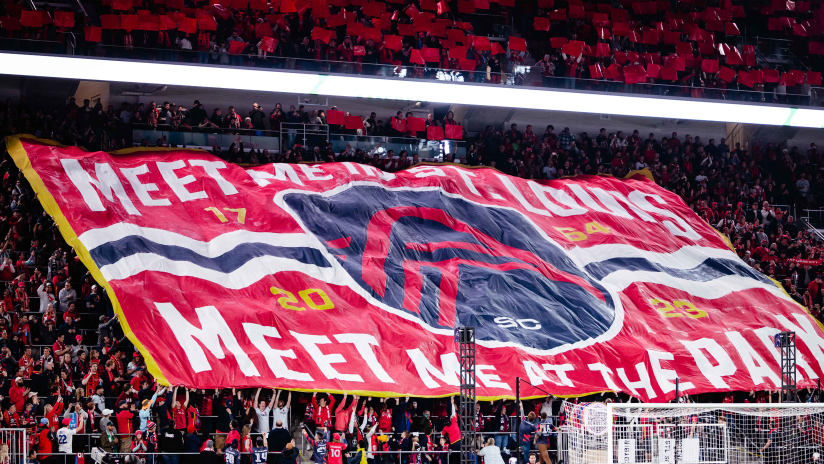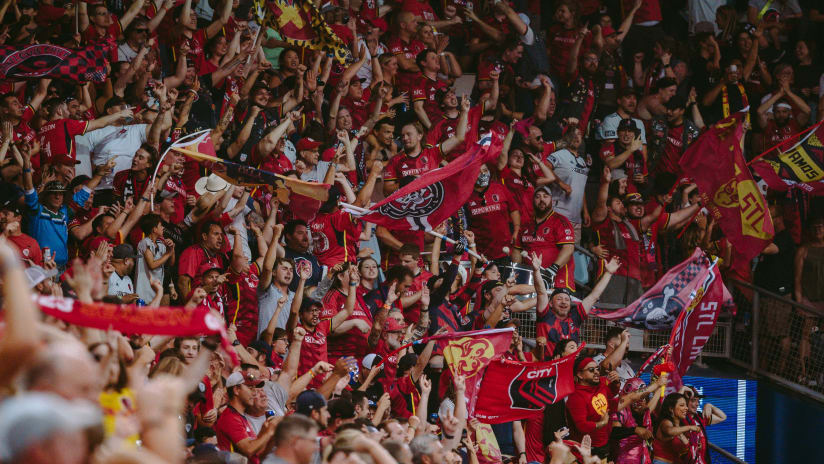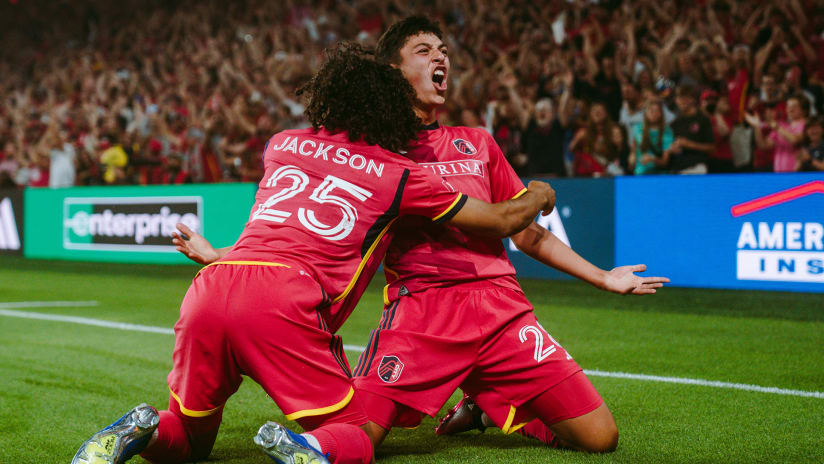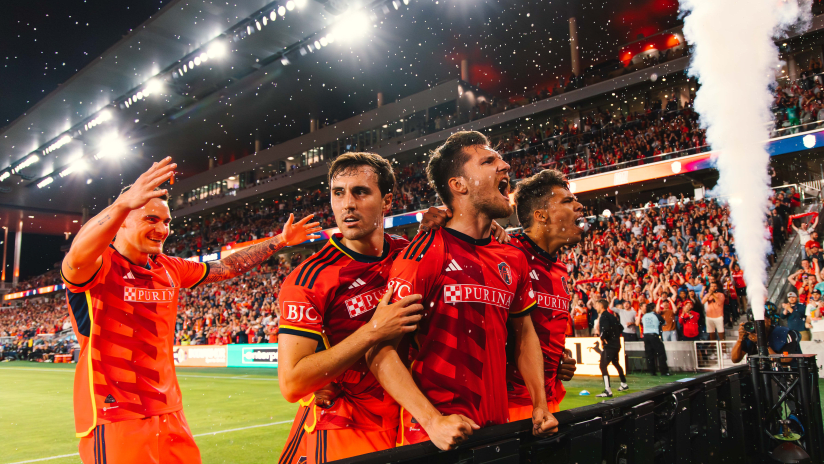St. Louis CITY SC had a plan. Before a ball was kicked in their inaugural MLS season, the entire org chart – from owners to front office, to coaches to players – were seemingly aligned on a club identity on and off the pitch, and they weren’t shy about sharing it.
Publicly, sporting director Lutz Pfannenstiel raised eyebrows by declaring “the team needs to be the star” – the type of messaging that could be interpreted as front-office spin for the club’s comparatively light roster spend. Privately, players were embracing the same ethos in the locker room, as head coach Bradley Carnell revealed during an end-of-year press conference following the team’s elimination from the Audi MLS Cup Playoffs in early November.
“\[João\] Klauss came to me after his San Jose appearance with Apple. He came back and said, ‘I feel we've been playing together like a long time. I feel we've been together for three years. I feel everyone doubts us,’” Carnell said of his DP striker's takeaway after returning from MLS’ Media Marketing Day before 2023 preseason.
“And Klauss was almost the catalyst for all of the narrative that we drove, the ‘everybody's nobodies.’”
Klauss and company certainly weren’t the first in MLS history to embrace a “nobody believes in us” mantra, but they were mostly right – not just about perceived media slights, but also that the club’s approach to year one had merit.
After many pundits picked them to finish last in the Western Conference, St. Louis and their roster of system-first players went on to enjoy a record-setting debut season. They started their campaign with a 5W-0L-0D run (the best beginning for an expansion club in league history) and finished it as the first-place team in the Western Conference (earning a berth in the 2024 Concacaf Champions Cup).
Despite a Round One Best-of-3 series crash out to No. 8 seed and regional rival Sporting Kansas City, the club overshot expectations.
Now they’re faced with a new question: What’s next?

Staying the course
One of St Louis’ oft-repeated goals is to field a team that represents their city, and given the region’s record of turning out national team regulars both past and present – Tim Ream, Josh Sargent and Taylor Twellman, to name a few – that target may have as much practical application on the field as it does marketing potential off it.
In the end-of-year presser, both Pfannenstiel and Carnell reiterated the need to find players that represent St. Louis’ “blue-collar” system of play.
“The system is always the main thing, and we identified key players or players in certain areas to make sure that they are ready to apply the principles,” said Carnell, who cited seven players making their first-team debuts en route to a record-setting year as proof of concept for both STL's game model and player recruitment process.
“ ... I believe we have to stick to our strict routine, our strict principles and our philosophy because that is our DNA,” said Carnell.
While Pfannenstiel acknowledged the club will “look into the transfer market” to improve “areas of the squad where we can be better,” he was adamant that, overall, the team’s depth is in great shape.
“If you have 12 players who play nearly every single game, and the [substitutes] come on for three, five or seven minutes, then maybe you don't have depth,” said Pfannenstiel. “But we have guys who played two years ago in college who played 2,000 minutes. This is what I call depth.”
Community driven
Off the field, club president and general manager Diego Gigliani preaches a similar commitment to the long-term plan. Gigliani‘s arrival at the club was announced in April, after the season had already started, but he’d been in talks with ownership as early as December 2022. Despite an initial lack of familiarity with St. Louis’ deep soccer history, the vision pitched to him by CITY SC’s owners quickly took root.
“If you would have given me the map of the US and said, 'Point your finger on the city that you think is going to be the next up-and-coming soccer city,' I never would have put it on St. Louis. I would have put it on 20 other cities before,” Gigliani, who was born in Argentina, but raised in both the US and Europe, told MLSsoccer.com.
“But the more I learned – not just about the project, but even in terms of like the history of soccer in the city – I realized that there really was already something that was highly demanded by the city.”
Case in point: 50,000 season-ticket deposits within the first 24 hours of availability.

Gigliani joined St. Louis after 10 years with City Football Group – the global ownership group behind Premier League giants Manchester City and, of course, MLS Cup 2021 champions New York City FC. With CFG, he helped identify key markets to buy into and the clubs they could acquire to do so.
Once deals went through, the work of revitalizing those clubs’ infrastructures began – a task he can skip in St. Louis.
“Typically, what I was doing was arriving at a club that had an awful infrastructure, underperforming versus expectation and versus history with a need for radical revamping of the sporting team, the head coach, often the organization,” said Gigliani. “So a major fix-and-build approach. That was very different from here. I arrived and the stadium is built. It's amazing, it's beautiful.”
With CITYPARK’s state-of-the-art amenities – including a robust emphasis on high-quality local restaurants – driving healthy revenue streams, Gigliani is free to focus on the big picture. But the emphasis, even in the broad view, remains local.
“Part of the objective over the next, say, five, 10 years needs to be definitely around not just community from the perspective of engaging with more fans that can come to our stadium. … But I think more importantly, it's how else is the club helping to drive growth in the city?” Gigliani posed.
“So it could be our CITY Futures program, which is finding a way to bring soccer to different areas of the city that otherwise wouldn't be able to access that sport, and maybe create great footballers. But especially when it comes to developing the city overall, kind of helping to be a catalyst for more economic investment and growth in the city.”
CITY SC say more than $1 billion in new real estate developments and construction projects have either broken ground or been announced in downtown St. Louis since MLS awarded them an expansion team in August 2019. For Gigliani, CITYPARK has acted as a “key anchor project in the Downtown West area of the city that has desperately needed some redevelopment.”
On the sporting side, Gigliani’s commitment to developing all St. Louis has to offer is equally strong: “We know we would love for us to be able to nurture and develop some top talent that comes from St. Louis and makes it on to our first team and eventually onto the US men's national team and maybe export abroad.”

The next evolution
While Gigliani, Pfannenstiel and Carnell all maintain the club’s goals on and off the pitch are more focused on sustained success than short-term accomplishments, the reality is year one set a remarkably high bar for results, which helped create match-in, match-out fervor at home games.
“We know that success on the pitch translates into success off the pitch. And I think everyone, internally and externally, can sense that from the season,” said Gigliani.
To keep wowing fans and make the next step of winning trophies, Carnell acknowledges there are areas to improve, citing the need for better defensive actions in critical moments – especially against Kansas City in the playoffs – and chance creation in the final third. When it comes to an overall style of play, though, both he and Pfannenstiel bristle against the notion the team’s approach is solely defined by their heavy pressing and quick counterattacks to goal.
“We did play some games where we had possession. We dominated possession. We won games deservedly. We created great goals. So we don't want to be that one team who only presses you,” said Pfannenstiel. “I think we have good enough quality with players who are good enough with the ball and we proved that.
“So it's always, as I said, a bit too easy to say, 'Well, that's like a…' What is the English word for it? Like a 'rumble in the jungle team – '”
“A Sunday League team,” Carnell interjected.
“We are not that,” Pfannenstiel confirmed.

But while St. Louis did notch many comprehensive wins en route to the best goal differential in the Western Conference, the deeper numbers back the current perception around their style of play. Per TruMedia via StatsPerform, St. Louis averaged the least amount of total possession and the shortest time on the ball per possession in the league. They also finished the season first in total tackles, second in duels and fourth in interceptions.
The other MLS team with stats most closely resembling those in 2023 were the New York Red Bulls, with whom Carnell spent five years as an assistant and interim head coach. The Red Bulls set the MLS record for most consecutive postseasons-reached at 14 this season, but they're yet to win an MLS Cup, raising questions about a potentially low ceiling for press-heavy styles.
Pfannenstiel says Carnell’s own playing history as a “terrier” who was “uncomfortable to play against,” coupled with his experience as an assistant at Red Bulls, influenced his decision to hire the now 2023 Sigi Schmid Coach of the Year finalist. But he maintains: “Obviously we want to play a little bit different [than the Red Bulls].
Just how much St. Louis plan to change tactically remains to be seen next year. But no matter how things shake out, the influence of the city's culture and soccer history will no doubt play a key role.
“We are not trendsetters. This is a city that inspired us to perform or outperform or overperform because of the legacies that were left here in place way before our time,” said Carnell, before acknowledging local reporters in the room.
“You sit in the back there, you know what it's all about: history and legacies.”











